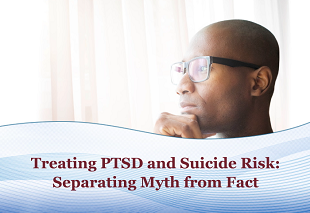PTSD: National Center for PTSD
Treating PTSD and Suicide Risk: Separating Myth from Fact
Continuing Education
This section brings together free in-depth Continuing Education resources for the Professional community concerned with trauma.
Treating PTSD and Suicide Risk: Separating Myth from Fact
- Date Created: 03/21/2019
- Time to Complete: 1 hour
- Credits: APA, ASWB, ACPE, NBCC, Other Orgs
- Skill Level: Intermediate
- Course Series: PTSD 101
 Author(s):
Author(s):
Description
PTSD is a well-established risk factor for suicidal behavior. Although suicidal thoughts and behaviors are common among patients with PTSD, myths and misconceptions about suicide exist among clinicians. In light of these myths and misconceptions, many clinicians are reluctant to provide empirically-supported treatments to patients with PTSD who also report suicidal thoughts and/or a history of suicidal behaviors.
This course reviews data that supports the safe and effective treatment of PTSD among those with suicide risk. The course describes recommendation for empirically-supported trauma therapies to treat suicidal patients with PTSD.
Goals and Objectives
- Describe a cognitive behavioral model of suicide.
- Identify common myths about individuals with PTSD and suicide risk.
- Describe recommended approaches for treating suicidal patients with PTSD.


























